Gas Fireplace Leak
A gas fireplace is an excellent source of warmth and ambiance in many homes. It’s efficient, clean-burning, and relatively low maintenance. However, like any gas-powered appliance, it can develop issues over time. One of the most concerning problems you might encounter is a gas leak. While gas fireplaces are designed with safety in mind, leaks can happen for various reasons, and they pose a serious risk to your health and home. Let’s discuss the causes of gas fireplace leaks, the dangers they present, and how to safely address these issues.
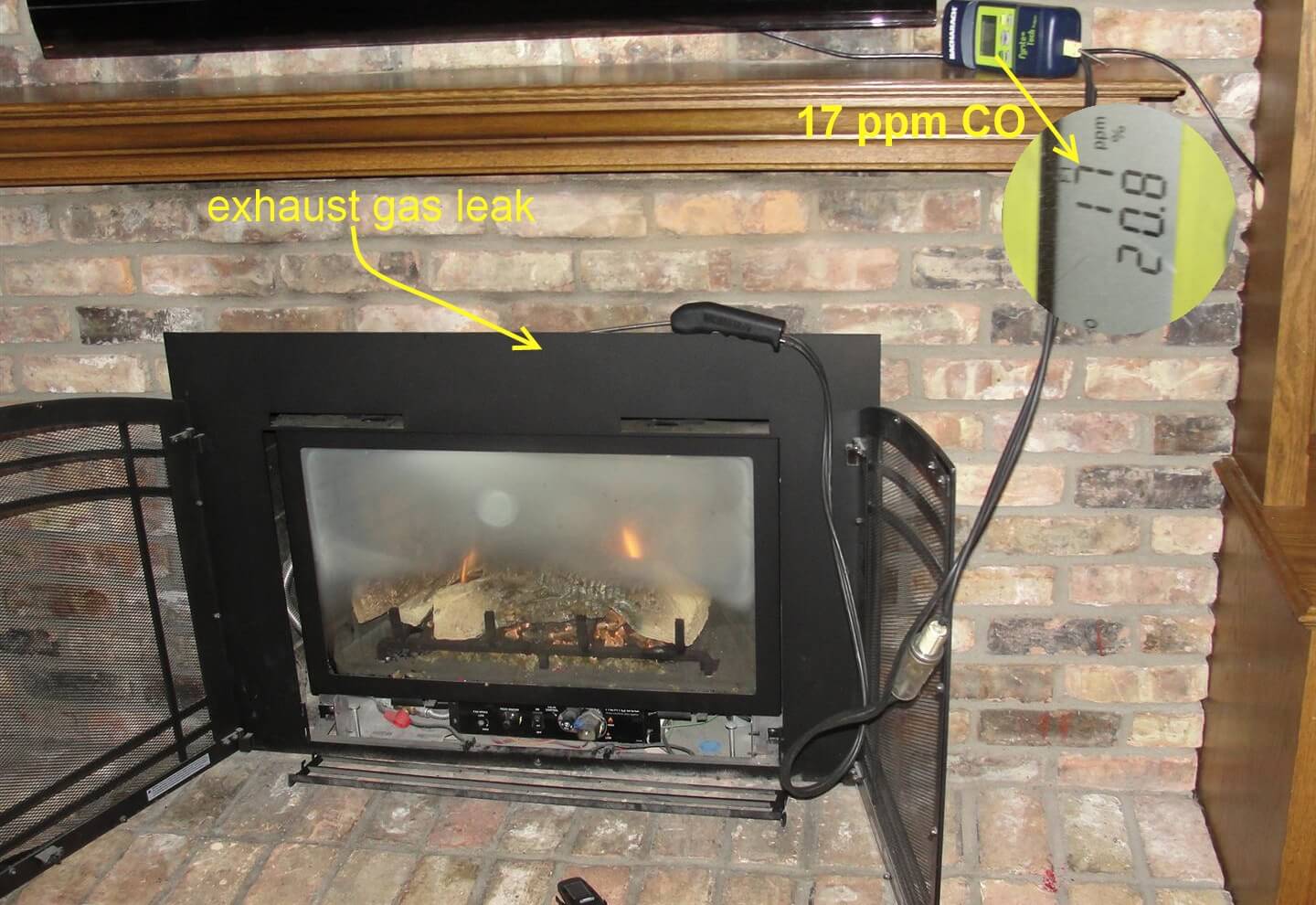
Common Causes of Gas Fireplace Leaks
Gas fireplace leaks can occur for several reasons, and it’s essential to identify the root cause before addressing the issue. One common reason for leaks is faulty installation. If the gas line or connections weren’t correctly sealed during installation, leaks can happen over time. It’s always a good idea to have your fireplace installed by a licensed professional who knows how to ensure proper sealing and connections.
Another potential cause of leaks is wear and tear. Over the years, parts of your gas fireplace—such as valves, connectors, or seals—can wear out, crack, or become loose. This is a natural part of the aging process for any appliance that uses gas, but it’s vital to regularly check for signs of deterioration to prevent leaks from happening.
Last, corrosion in the gas line can lead to a gas leak. Corrosion often occurs in older gas lines or those that haven’t been maintained properly. Moisture can build up inside the line, leading to rust and, eventually, holes or cracks in the metal. Regular maintenance and inspections can help identify these issues before they become dangerous.
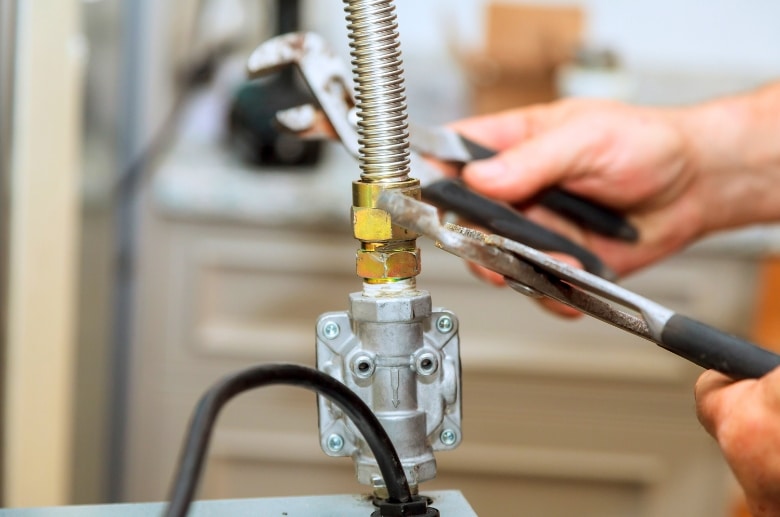
Signs That Your Gas Fireplace Might Be Leaking
It’s important to recognize the signs of a gas leak early to prevent harm. One of the most obvious signs is the smell of gas. Natural gas is typically odorless, but suppliers add a chemical called mercaptan, which gives it a distinct sulfur or “rotten egg” smell. If you notice this smell around your fireplace, it’s crucial to act immediately by turning off the gas and contacting a professional.
Another sign of a potential leak is hissing sounds near the fireplace. This sound indicates that gas is escaping from a valve, connector, or line. Even if you don’t smell gas, hissing sounds are a strong indicator that there’s a problem with your gas system.
Last, watch for unexplained physical symptoms. Gas leaks can cause headaches, dizziness, nausea, and even shortness of breath. If you or anyone in your household experiences these symptoms, especially when the fireplace is in use, it’s critical to evacuate the home and seek medical attention while a professional assesses the leak.

Dangers of a Gas Fireplace Leak
The risks associated with a gas fireplace leak are serious and should never be underestimated. One of the most dangerous threats is carbon monoxide (CO) poisoning. When gas leaks from your fireplace, it can lead to an accumulation of carbon monoxide, a colorless, odorless gas that is deadly when inhaled in large amounts. It’s often called the “silent killer” because it’s hard to detect without proper equipment, like a CO detector.
A gas leak can also lead to fires or explosions. Gas is highly flammable, and even a small leak can result in an explosion if it comes into contact with a spark or open flame. This could be disastrous, leading to severe property damage or even loss of life.
also, there’s the risk of environmental damage. Gas leaks can contribute to poor indoor air quality, affecting both the health of those living in the home and the environment outside. While this might not be as immediate of a danger as carbon monoxide poisoning or fire, it’s still an important factor to consider.
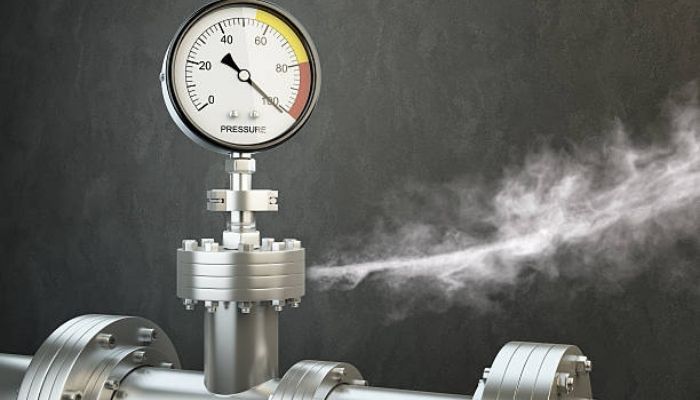
Steps to Take if You Suspect a Leak
If you suspect a gas fireplace leak, your first priority should be safety. Immediately turn off the gas supply to your fireplace, if it’s safe to do so. Most fireplaces have a shut-off valve located near the gas line or outside the home. Shutting off the gas can stop the leak from worsening while you figure out your next steps.
Once the gas is off, evacuate your home. Don’t attempt to repair the leak yourself or stay in the house to investigate further. Even a small amount of gas in the air can be dangerous, so it’s better to be safe and wait for a professional to arrive.
Finally, contact a licensed technician or your gas company to inspect the fireplace. A professional will have the tools and expertise needed to properly diagnose and fix the leak. Never attempt DIY repairs on gas lines or fireplaces, as doing so could lead to further damage or safety risks.

How to Prevent Gas Fireplace Leaks
Preventing a gas fireplace leak is all about regular maintenance and proper installation. Make sure your fireplace is installed by a professional who is familiar with gas systems. A correct installation will minimize the chances of leaks occurring later on due to poor connections or faulty equipment.
Regular inspections and maintenance are also key. Have a professional check your fireplace and gas lines at least once a year, especially before the colder months when you’ll be using the fireplace more often. They can detect early signs of wear and tear, corrosion, or loose fittings, which can then be fixed before they lead to a leak.
It’s also a good idea to install carbon monoxide detectors and gas leak detectors in your home. These devices provide an extra layer of safety, alerting you to any gas leaks or CO buildup before they become dangerous.
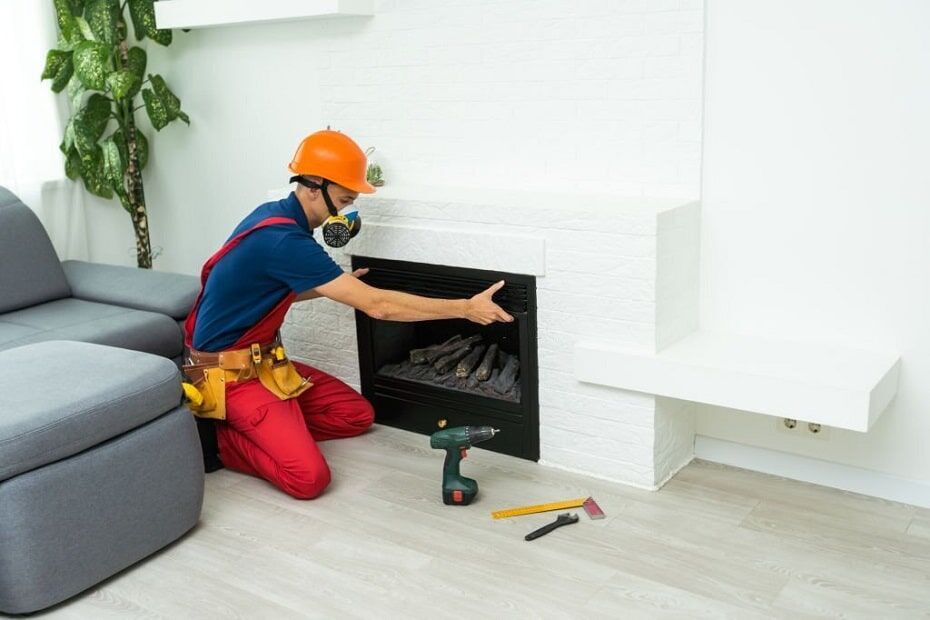
Gas Firetable Gas firepit, Gas water heater, Spa heater

24-Hour Chimney & Fireplace Emergency Service – Certified Chimney Tech
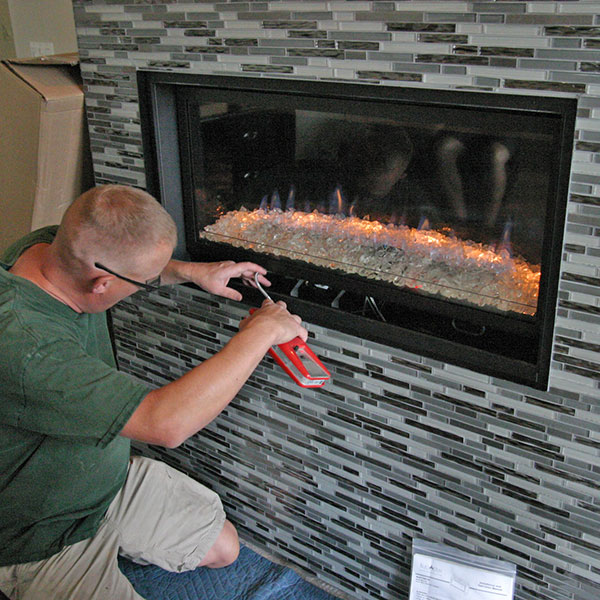
An outdoor fire pit lit up at night

Firebowl 42″ On Travertine Stand W Azuria Reflective Glass Gas firepit, Gas water heater, Spa

Pin by Doug Zettles on Outdoor Gas Fire Effects Gas firepit, Gas water heater, Gas fires

Gas leak fireplace

Gas Fireplace Leak – Mriya.net

Warning Signs That You Have a Gas Leak in Your Fireplace

Related Posts:
- Gas Fireplace Timer
- Natural Gas Fireplace Heaters
- Regency Gas Fireplace Prices
- Gas Fireplace Regulator
- Gas Fireplace with Bookshelves
- Gas Fireplace Flue Closed
- Gas Fireplace Building Code
- Gas Fireplace Venting Requirements
- Gas Fireplace Components
- Gas Fireplace Removal
Gas fireplaces are a popular choice for many homeowners due to their convenience, energy efficiency, and aesthetic appeal. However, one potential issue that can arise with gas fireplaces is a gas leak. A gas fireplace leak can be a serious safety hazard if not addressed promptly. In this guide, we will discuss the benefits of gas fireplaces, the pros and cons of using them, common mistakes to avoid, and answer some frequently asked questions related to gas fireplace leaks.
Benefits of Gas Fireplaces
There are several benefits to having a gas fireplace in your home. One of the main advantages is their convenience. Gas fireplaces can be turned on and off with the flip of a switch or the press of a button, making them easy to use and maintain. Additionally, gas fireplaces are cleaner and more environmentally friendly than traditional wood-burning fireplaces, as they produce fewer emissions and do not require the use of wood.
Another benefit of gas fireplaces is their energy efficiency. Gas fireplaces are more efficient at heating a room compared to wood-burning fireplaces, as they do not lose heat through the chimney. This can help reduce heating costs during the colder months. Gas fireplaces also provide a consistent and controllable heat source, allowing you to easily adjust the temperature to your liking.
Pros and Cons of Gas Fireplaces
While there are many benefits to having a gas fireplace, there are also some drawbacks to consider. One potential drawback is the cost of installation and maintenance. Gas fireplaces can be more expensive to install than wood-burning fireplaces, as they require professional installation and regular maintenance to ensure they are functioning properly.
Another potential con of gas fireplaces is the risk of a gas leak. Gas leaks can be dangerous if not detected and addressed promptly. Signs of a gas leak include a rotten egg smell (due to added odorants in natural gas), hissing sounds near the fireplace, or physical symptoms such as dizziness or headaches. It is important to have your gas fireplace inspected regularly by a professional to prevent leaks.
Common Mistakes to Avoid
One common mistake homeowners make with gas fireplaces is neglecting regular maintenance. It is essential to have your gas fireplace inspected annually by a qualified technician to ensure it is operating safely and efficiently. Regular maintenance can help prevent issues such as gas leaks from occurring.
Another mistake to avoid is attempting to repair or modify your gas fireplace yourself. Gas appliances should only be serviced by trained professionals who have experience working with these systems. Attempting DIY repairs can lead to further damage or potential safety hazards.
How do I know if my gas fireplace is leaking?
Signs of a gas leak from your fireplace may include a rotten egg smell (due to added odorants in natural gas), hissing sounds near the fireplace, or physical symptoms such as dizziness or headaches.
What should I do if I suspect a gas leak from my fireplace?
If you suspect a gas leak from your fireplace, it is important to evacuate your home immediately and contact your local gas company or emergency services for assistance. Do not attempt to locate or repair the leak yourself.
How can I prevent gas leaks from occurring in my gas fireplace?
To prevent gas leaks from occurring in your gas fireplace, it is essential to have it inspected annually by a qualified technician and follow all manufacturer’s guidelines for proper maintenance and usage.
Can I use my gas fireplace if I suspect a leak?
If you suspect a gas leak from your fireplace, do not operate it under any circumstances. Contact your local gas company or emergency services for assistance.
While there are many benefits to having a gas fireplace in your home, it is essential to be aware of the potential risks associated with them, such as gas leaks. By following proper maintenance practices, having your fireplace inspected regularly by a professional, and knowing how to detect and respond to signs of a leak, you can enjoy the warmth and comfort of your gas fireplace safely. If you suspect a gas leak from your fireplace, it is important to take immediate action to ensure the safety of your home and family. Evacuate the area, refrain from using any open flames, and contact your local gas company or emergency services for assistance. Do not attempt to locate or repair the leak yourself, as this can be dangerous.
Regular maintenance and inspections of your gas fireplace by a qualified technician can help prevent gas leaks from occurring. Following all manufacturer’s guidelines for proper usage and maintenance is essential to ensure the safe operation of your gas fireplace.
Being aware of the potential risks associated with gas fireplaces and knowing how to respond to a gas leak if one occurs can help you enjoy the benefits of your fireplace while prioritizing safety. If you have any concerns about the safety or operation of your gas fireplace, do not hesitate to seek professional assistance. Gas fireplaces are a great addition to any home, providing warmth, convenience, and energy efficiency. However, it is important to be aware of the potential risks associated with gas fireplaces, such as gas leaks. By following proper maintenance practices, having your fireplace inspected regularly by a professional, and knowing how to detect and respond to signs of a leak, you can enjoy the benefits of your gas fireplace safely.
If you suspect a gas leak from your fireplace, it is crucial to evacuate the area immediately and contact your local gas company or emergency services for assistance. Do not attempt to locate or repair the leak yourself, as this can be dangerous.
Regular maintenance and inspections of your gas fireplace by a qualified technician can help prevent gas leaks from occurring. Following all manufacturer’s guidelines for proper usage and maintenance is essential to ensure the safe operation of your gas fireplace.
Being proactive about safety measures and knowing how to respond in case of a gas leak can help you enjoy the comfort and warmth of your gas fireplace with peace of mind. If you have any concerns about the safety or operation of your gas fireplace, do not hesitate to seek professional assistance. Stay safe and enjoy the benefits of your gas fireplace responsibly.